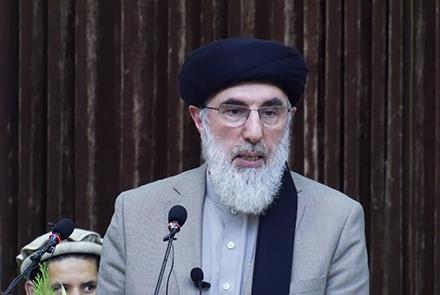Hizb-e-Islami leader Gulbuddin Hekmatyar, who is also running for president in July 20 elections, on Thursday said the planned consultative Loya Jirga on peace will not help resolve the stalemate in Afghanistan.
This comes ten days after President Ashraf Ghani called for a grand consultative Jirga, a traditional assembly, on the peace process in the country amid Washington’s marathon diplomatic efforts to facilitate direct talks between the Afghan government and the Taliban who has been fighting Afghan and foreign forces for the past 18 years.
“We are going towards the consultations. There is no risk in holding consultations,” Ghani said at the time. “We have to determine those values which should not to be compromised. The scale of flexibility and the cost of peace must be clarified.”
Ghani mentioned that work has started on a post-peace government and that the topic will be discussed in the third Kabul Process Conference in March.
However some of Afghanistan’s mainstream and influential politicians, among them Ghani’s predecessor Hamid Karzai who ruled the country almost for 13 years, have widely welcomed the proposal to convene a Consultative Loya Jirga in order to end the current stalemate in the country.
Hekmatyar meanwhile reiterated the call for timely elections in the country, saying the election is the only solution to create a “credible and legitimate” government.
“Afghanistan needs a neutral government which would not have a link to a foreign country,” he said.
He said that the war in Afghanistan and in the region will continue until there is a neutral and sovereign government in Afghanistan.
Hekmatyar also voiced his objections to the presence of foreign forces in Afghanistan, saying foreign troops presence in Afghanistan is one of the reasons which is prolonging the war in the country.
Talking on the intra-Afghan dialogue, Hekmatyar asked the Taliban to honor the call by the Afghan government for direct talks.
The Taliban who has been fighting the Afghan forces and their foreign counterparts have constantly refused to talk with the Afghan government and instead branded the Afghan government a “puppet”.
Ghani proposes the Jirga at a time that Taliban has constantly refused to hold direct talks with the Afghan government. The group has met four times with the United States officials in the last four months as well as one time with Afghan politicians in Moscow this month. The US and Taliban are expected to meet again on 25th of this month in Doha, Qatar where the Taliban also keeps a political office.
The attendees in Moscow talks, held on February 5 and 6, issued a nine-article declaration in which the two sides agreed on continuation of the talks, supporting a powerful centralized government and on protecting the achievements of last 18 years in Afghanistan.
Some politicians attending Moscow talks proposed the establishment of an interim government; however, in the Moscow declaration did not mentioned anything about such a plan.
But on Wednesday, Ghani’s Special Representative for Regional Affairs for Consensus on Peace Mohammad Umer Daudzai said that there was the possibility that direct talks between government and the Taliban would start in the next few months.
Addressing an Afghanistan Independent Human Rights Commission conference, Daudzai said people will soon witness direct negotiations.
“From today up to a few months, we will witness direct negotiations between the Afghan government and Taliban and that is the main negotiation,” said Daudzai.
Daudzai, who is also the organizer of the planned grand consultative jirga for peace, said the jirga will be held over four days - from 17 March to 20 March – and that participants will share views around peace talks. He said based on the discussions, the jirga could be extended.
“The jirga’s opening date is scheduled for 17 March and will end on 20 March. But if the discussions continue, it will be extended,” said Daudzai.

